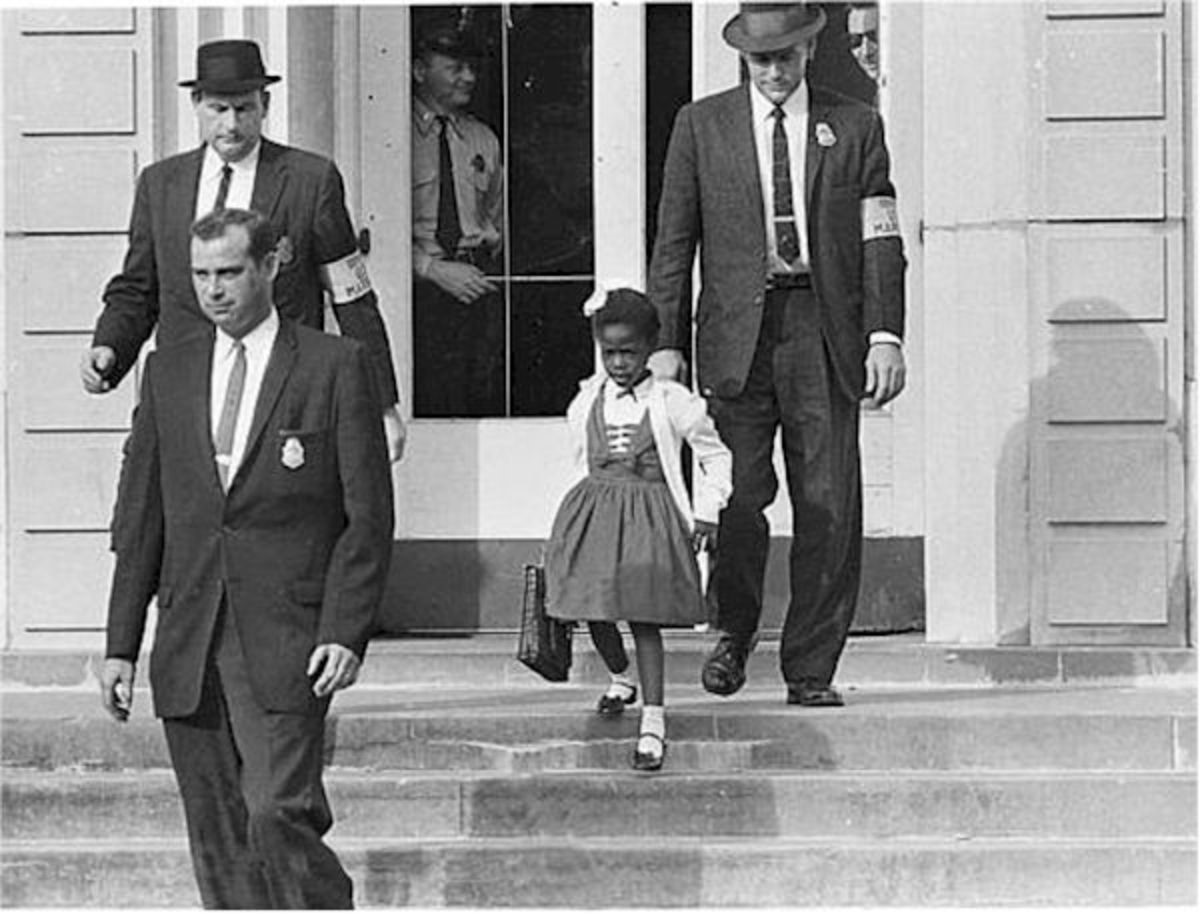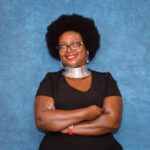The R-Word

On November 14, 1960, Ruby Bridges was the first African American child to integrate an all-white public elementary school in the South.
Ms. Bridges was escorted to class by her mother and US Marshals due to violent mobs of white men and women who arrived to protest.
The school in question was William Frantz Elementary; the very school I would attend almost 18 years later not aware of the history. When I attended 4th grade at Frantz, the racial landscape was drastically different. The majority of students and teachers were African American.
Ms. Bridges once shared that during this very public landmark experience, she recalled being scared, as most children would be. This fear charted the course for her to become a civil rights activist years later.
You may be wondering, why am I providing all of this context? I‘ve been an OD-HR-DREI consultant for over 25 years. During that time, I have primarily worked in institutions as an employee while consulting via contracts and projects on the side. My journey to become a consultant started in my second year of graduate school in 2005. (Then again, I suppose I truly started this work when I walked in Ms. Bridges’ shadow at Frantz.) This year, I have fully stepped away from institutions as an employee, and I am consulting full-time.
My most recent role was an HR Executive at a non-profit agency. During my transition out a few months ago, I attended an outpatient mental health presentation about Trauma-Informed Care, a service paradigm for work with children and families. The presenter was a white woman. The audience consisted largely of financially secure and well-intentioned white leaders with access to large amounts of financial wealth. Everyone’s heart was in the right place, but I found something lacking in the discussion that day.
The presentation provided an introduction to trauma, and how it works; specifically, when a child lives in chaos or an unhealthy home environment, they can experience toxic stress, which in turn has been shown to impact child development significantly. The presenter eloquently flagged that the model focuses on trauma within the home and not environmental factors surrounding the home. But still…I was sitting there, waiting patiently to hear the R-Word in some form (just as you wait patiently to read what it is). The PH. D.-level clinician continued to impress upon these very important [white] people the value of her organization’s services.

A few minutes go by. I am still waiting to hear the R-Word…aka Racism.
I believe the look on my face signaled a cue, because at that very moment the presenter moved to a slide that discussed discrimination, oppression and prejudices. I was getting proud, but my pride quickly deflated when she said, and I quote, – “Racism plays a part of the trauma. But as a ‘white woman’, I cannot speak to all of it, because it is not my experience.”
Waytaminute!! Plays a part? I nearly fell out of my chair. If you have had the opportunity to share in my learning at any point, you would know my passion and compassion for racial equity and social justice.
Simply put, racism is a public health crisis and the cause of the some of the most damaging toxic stress children have ever experienced, and we’re only beginning to understand its impact. Dr. Joy DeGruy coined the term Post Traumatic Slavery Disorder to announce to the world that black children experience extreme trauma. In most cases, this robs these children of the ability to bring their best selves to healthy adulthood.
The weird thing for me is two-fold: (1) the presenter had been in trainings I have provided, where I stress that it’s confronting racism in the moment that counts the most and yet – the privilege flag hit the field. And (2) I began writing this article a month ago and couldn’t quite finish it. Now I know why.
I attended the 7th Annual Ancestral Healing Conference, convened by my mother – Dr. Orisade Awodola. Yes, my mom is a powerful visionary. The keynote for this event was Dr. Wade Nobles, and he was dynamite! It was my first time meeting him, or even listening to him. He had no idea that this writeup on the R-Word was in the works, but I could have sworn that he read my mind. He said so many powerful things and to my surprise spoke of the fallacy and short-sightedness of Trauma-Informed Care for the Black Family. I was busy working the event during his speech, but my ears perked up when he mentioned these buzz words.

He pointedly and unapologetically educated us that it is not Trauma-Informed Care that is needed by Black families, but Psychological Terror-Informed modalities to heal what we have been through and continue to be subjected to daily. Healing from trauma is one thing, but helping families heal from terror requires us all to confront the terrorist—in other words, the R-Word.
I also learned at the conference that the Black Family has endured generations of warfare on our very existence and on our children. The system of racism is designed to keep us from believing in our value and intellect. Each generation is a witness to and a victim of this system. Dr. T. Owens Moore dropped this last bit of science on me at the conference through his work, Dark Matters Dark Secrets.
Pan back to the presentation I attended a few months ago. I finally heard the R-Word, but it was diminished with the reinforcement of “speaking as a white woman”—meaning, “I am ignorant in this space and not required to be proficient or accountable, so let me just reinforce my social position of dominance.” This kind of language demonstrates the optics of a racial equity change agent, but allows the individual to keep their position of white privilege. It’s an expression of white fragility; a way of keeping racism in the unknown, rather than doing the work of confronting and understanding it.
I exhaled and paused after I heard this. I had a couple of choices, as I saw it. I could raise my hand to speak in the moment; or I could wait and talk to the presenters afterward. I did neither. Instead, I sent a text with my reaction to one of the co-presenters. There was still time, before the presentation ended, to courageously discuss systemic, structural or institutional racism, even in a room dominated by whiteness.
It didn’t happen, of course. The R-Word was glossed over and replaced with a vague slogan: “The system is broken.” I challenge this thinking, because the system is working as it was designed: to produce outcomes that support structural and systemic racism. Thus – not broken. I’d say it’s still working pretty well. (Why is it that when white people feel victimized by the system they designed, all of a sudden it’s “broken”?)

I then found a new light at the end of tunnel; it turns out that it was whiteness. To quote a dear mentor, “anytime a white person states: ‘speaking as a white man or woman,’ it reinforces white supremacy culture.” This has resonated with me in this work, because we have been programmed and socialized to keep reinforcing the system. Even when we believe we are dismantling it.
We are all speaking as a Human Being and this does not need to be reinforced. Unless you’re a Bot or you do not see my humanness because of my hue-manness.
My challenge to everyone is: be authentic in this work. If you are a lighter or pinker-hued human being who is accustomed to saying, “speaking as a w-person,” adopt the People’s Institute language: “Speaking as a white racist ____ (fill in the gender identification)”… then finish your statement. Until you can do that, you’re reinforcing the system of racism.
I left the presentation early with the burning desire to share a Racial Equity Public Service Announcement (REPSA). Which is to say:
“You cannot be in the business of serving historically marginalized & impoverished communities that are the direct result of systemic racism and not have the balls to say RACISM or discuss it for the system it is. This omission is offensive, and it obfuscates root causes when racism is not named in any form to describe the events, trends, and patterns of the American Racialized Iceberg.”
Keeping racism and racist definitions out of the conversation begins to reinforce bootstrap mentality. Blame for toxic stress in impoverished conditions is placed on the individual in the household for not having the hustle or drive to make something out of him, her, or themselves. Talking about trauma without talking about racism is also a little bit like describing a sore throat without using words like “virus” or “infection”: it focuses entirely on the symptom, and not at all on the source. Think of how misleading this would be in medicine!
If we’re serious about the work to dismantle the system of racism, we must affirm racial equity in all of our speak to manifest it; especially when we present strategies to improve community outcomes. To affirm racial equity is to discuss and plan to dismantle all forms of racism, and put action behind the plans. This requires accountability.
For businesses and nonprofits, it means committing money to the work—in the same way we earmark budget to launch other initiatives that move the organization forward. Got it?
If not, let me say this another way. To understand how the system of racism in America builds things to reinforce whiteness and white social dominant positioning, I provide this example shared to me in my WAMU days by Stephen Jones. This is titled, “Being left-handed in a right-handed world”:
To know the plight of a left-handed person or even pay attention to how all of our actions continue to create comfort for right-handed people, we must step back and think about what left-handed people experience.
My immediate examples include: the side of a coffee mug on which graphics are printed; where manual or automatic gears are positioned in a car; the position of toilet tissue holders in restrooms. These are small but meaningful things that left-handed people experience. So, what do lefties do? They adjust.
Now take this left-handed example and trade it with race. We live in a world built to serve whiteness and white comfort. For example: saying the R-Word is not considered polite, unless you’re at an official diversity, equity and inclusion event, training or conference.
This keeps the R-Word out of important conversations.
As a side note: why is it that at these DEI conferences, those of us with lived experience of the most marginalization due to race are not the keynotes and top presenters?
At minimum, the presenter line-up should represent the racial and gender diversity numbers of America. When Black or Brown women and men are finally called to participate, we are paid less than our white female counterparts and our booth space or workshops are placed square in the back by event planners (who are mostly white women).
The answer to the conference question I just posed (and the overall point of this paper) is: 60% of slave owners were white men, and 40% were white women. According to Stephanie E. Jones-Rogers, a history professor at the University of California – Berkeley. She states “Typically [Parents], gave their daughters more enslaved people than land”.
If historically, your history is being oppressed by your gender but rewarded by your race, how are you able to give up the rewards of white privilege?

Although, I applaud some of the work of my sisters stepping out to lift Black Women Equal Pay Day, I find myself perplexed, when I see them herald the tools of their four fathers to also oppress as the same time. I understand now more than ever that we can’t dismantle the system using the oppressors’ tools and thinking. Forever, redefining who and how racial equity and DEI work must be led.
Today’s gatekeepers are not just white men. They are people who struggle with internalized oppression in all skin hues, but especially white gender oppressed women. However, because of their racial privilege, we are all graced with the phenomenon of white women authors who command invitations, platforms and salaries to discuss being marginalized by white men, and to lead workshops on topics like white fragility. The problem with this is that a lot of these presenters are now speaking about theoretical black or brown-lived experiences—”as told by a white woman”—when they talk about race at all.
If you are a Change Agent with a pinkish hue, my call to action is to stop using the words of my experience—and that of others who look like me—to tell the story of your whiteness, and how it makes you feel. Partner with one of us Black or Brown people to do this work. There is room for all of us. And equitably share the financial profits from disrupting white comfort in a way that allows relationship with people of all hues in the room. Until then, stop placating us and stalling the work of diversity, racial equity and inclusion!

Cover Photo Source: Ruby Bridges and marshals leaving William Frantz Elementary School, New Orleans, 1960. She was escorted both to and from the school while segregationist protests continued. Photo: Uncredited DOJ photographer (Via [1]) [Public domain], via Wikimedia Commons